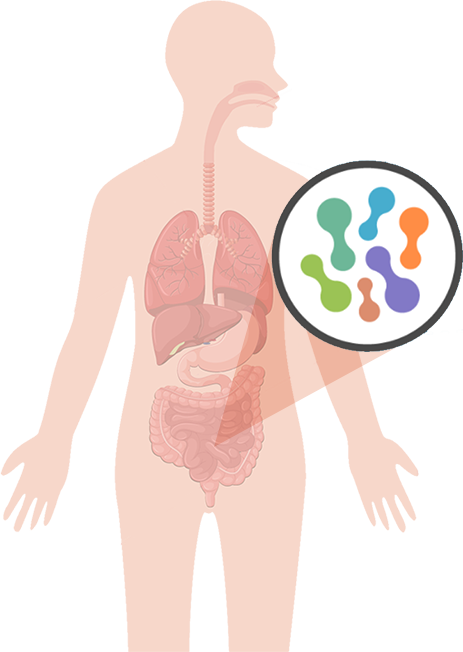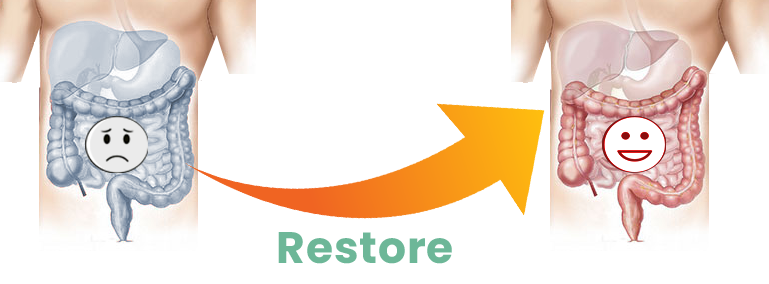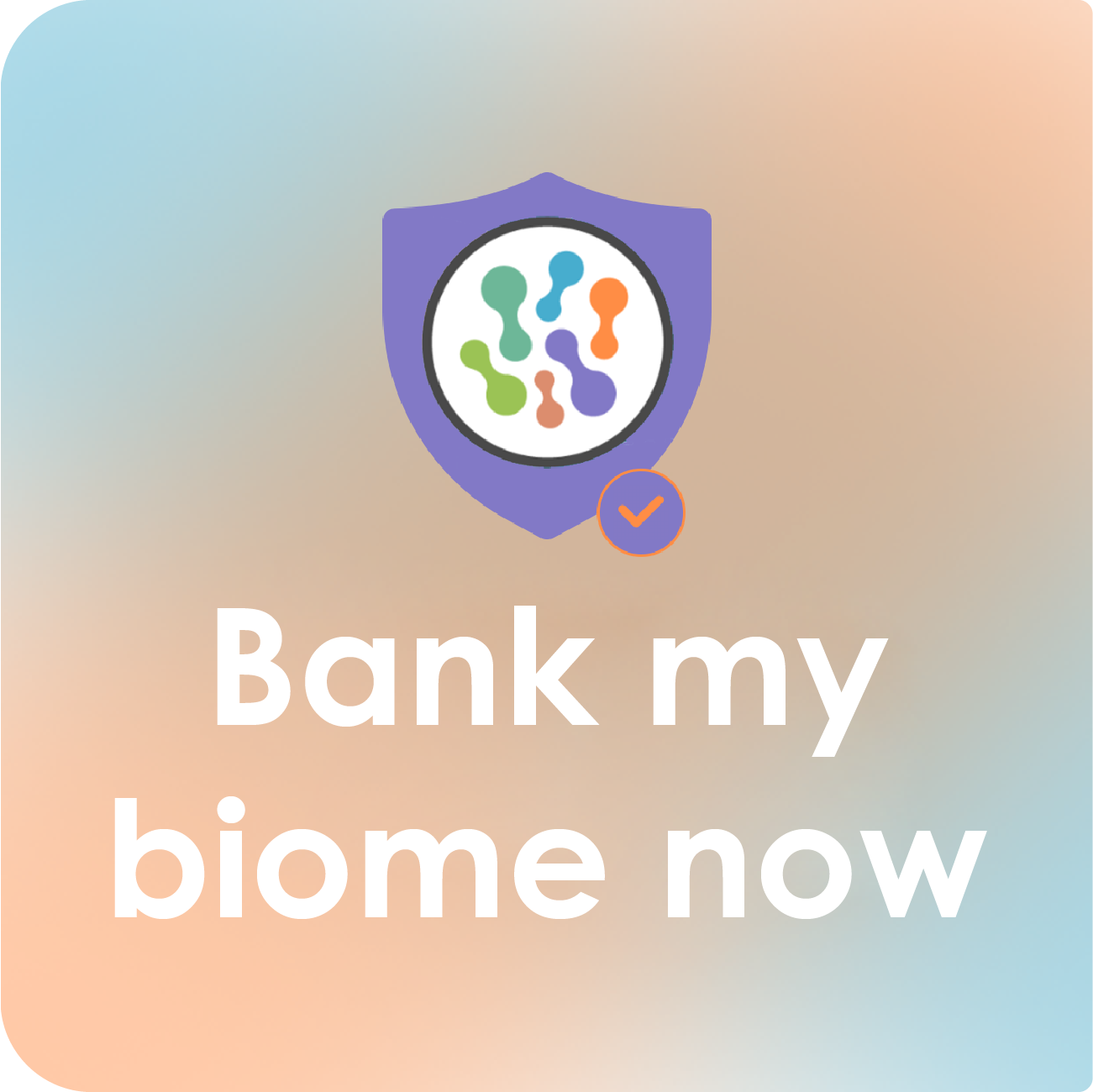What if you could capture your health today and have it stored and ready for your future self?
Our gut microbiome plays an important role in our health and well-being, when your gut microbiome is stable and healthy, you’re healthy 1–3. And when it's not, you’re not 1,4–18. Banking your biome allows you to bottle your unique, healthy and vital gut microbiome now and play rewind back to a healthy gut and a healthier you in the future 19–22!

What is banking your biome?
Banking your biome is a process where a person saves their own healthy
microbiome by providing a stool sample 23–25. At a later time, when ready, the same person receives their own microbiome in capsule form, serving as their own donor for Autologous Fecal Microbiota Transplantation or a-FMT (using one’s own processed and purified gut microbiota to restore your own gut microbiome 23–25.) Research has shown that a-FMT can help restore the gut microbiome after disruption (such as antibiotics), with minimal side effects and is suggested to be a promising strategy to help modulate one’s own gut microbiome 23–29.
We collect and store your microbiome (your stool sample) in your current healthy state and turn it into concentrated oral capsules for you to use whenever you need it. We utilize our state-of-the-art lab and best-in-practice lab manufacturing standards to process your sample and create these highly concentrated oral capsules, which are about the size of a probiotic. We use only your unique microbiome, allowing you to have your healthy microbiome ready when you need it!
Why storing your microbiome today could lead to a better tomorrow?
What are the benefits of storing your healthy gut microbiome (from your stool) to ensure they have it ready in the future, just in case? There are a lot of possible reasons someone might want to bank their biome, here are the top 5 reasons, from the science to bank today for tomorrow.

1. Your microbiome is essential.
Your microbiome is as unique as a fingerprint, shaped by genetics and environmental influences, and fluctuates throughout your lifetime 23,30–39. A healthy microbiome is vital for many functions within the human body, including protecting against pathogens and regulating the immune system 1–3,40,41
Unfortunately, our gut microbiome can be altered by things like antibiotics, medications, lifestyle and diet 1,23,35–39,42, which can result in “gut dysbiosis” 1,12,16,34. Gut dysbiosis, or gut dysfunction, is associated with the development of diseases, infections and antibiotic resistance 1,7–12,43

2. Your microbiome is unique to you.
Your microbiome is unique to you, making you your best match. Banking your biome lets you store the unique qualities of your individual microbiome, so it is ready for you to use in the future when you feel it is appropriate 28.
Because each gut microbiome is unique, there is high variability between individuals, making a mismatch between donor and recipient a possibility 24,44–46. By banking your microbiome, you have the most physiologically relevant sample avoiding possible issues with donor matching 24,25,27,29,47–52.

3. a-FMT can help restore your gut microbiome

4. Science is still researching the importance of the microbiome.
Research into the importance of the microbiome is growing, and the role that a-FMT can play in optimizing a healthy gut is a real focus of study 15,25,53–55. Scientific and clinical research is looking to understand how our microbiome is not only crucial for maintaining our health but may also be uniquely effective in treating various conditions 1–3,10,40,41,52,56–59.
As we learn more about the gut microbiome, the importance of a healthy gut becomes vital! So storing your gut now allows you to be ahead of the curve, and ready for what we learn next about the gut microbiome!

5. Aging naturally leads to a deterioration in your microbiome
References: 1. Choi, H. H. & Cho, Y.-S. 2016, 2. Hooper, L. V. et al. 2012, 3. Sommer, F. & Bäckhed, F. 2013, 4. Gomaa, E. Z. 2020, 5. Chung, H.-J. et al. 2018, 6. Fan, Y. & Pedersen, O. 2021, 7. Johnson, D. et al. 2020, 8. Lee, L.-H. et al. 2019, 9. Lee, M. & Chang, E. B. 2021, 10. Ser, H.-L. et al. 2021, 11. Ternes, D. et al. 2020, 12. Xu, M.-Q. 2015, 13. Cani, P. D. 2018, 14. Lynch, S. V. & Pedersen, O. 2016, 15. Marchesi, J. R. et al. 2016, 16. Petersen, C. & Round, J. L. 2014, 17. Tu, P. et al. 2020, 18. Moloney, R. D. et al. 2014, 19. Cryan, J. F. et al. 2019, 20. Haifer, C. et al. 2020, 21. Kong, F. et al. 2019, 22. Li, H. et al. 2021, 23. Rinott, E. et al. 2021, 24. Bulow, C. et al. 2018, 25. Basson, A. R. et al. 2020, 26. Malard, F. et al. 2021, 27. Pérez-Matute, P. et al. 2020, 28. Suez, J. et al. 2018, 29. Taur, Y. et al. 2018, 30. Hall, A. B. et al. 2017, 31. Odamaki, T. et al. 2016, 32. Perez-Muñoz, M. E.et al. 2017, 33. The Human Microbiome Project Consortium. 2012, 34. Wilson, B. C.et al. 2019, 35. Yatsunenko, T. et al. 2012, 36. Ussar, S. et al. 2015, 37. Goodrich, J. K. et al. 2014, 38. Wu, G. D. et al. 2011, 39. Turnbaugh, P. J. et al. 2006, 40. Maynard, C. L. et al. 2012, 41. Buffie, C. G. & Pamer, E. G. 2013, 42. Britton, R. A. & Young, V. B. 2014, 43. Pamer, E. G. 2016, 44. Bakken, J. S. et al. 2011, 45. Meighani, A. et al. 2016, 46. Fischer, M. et al. 2016, 47. Lee, C. H. et al. 2019, 48. Schulz, M. D. et al. 2014, 49. Collins, S. M.et al. 2013, 50. Turnbaugh, P. J. et al. 2009, 51. Fei, N. & Zhao, L. 2013, 52. Vrieze, A. et al. 2012, 53. Kootte, R. S. et al. 2017, 54. Terveer, E. M. et al. 2017, 55. Lau, A. W. Y. et al. 2021, 56. Aron-Wisnewsky, J. et al. 2019, 57. de Groot, P. F. et al. 2017, 58. Nowak, A. et al. 2019, 59. Allegretti, J. R. et al. 2019. 60. Claesson, M. J. et al. 2011, 61. Claesson, M. J. et al. 2012, 62. Badal, V. D. et al. 2020, 63. Bana, B. & Cabreiro, F. 2019, 64. Clemente, J. C. et al. 2012, 65. Askarova, S. et al. 2020, 66. Nagpal, R. et al. 2018, 67. Salazar, N. et al. 2017, 68. Kumar, M. et al. 2016, 69. Bárcena, C. et al. 2019, 70. Fransen, F. et al. 2017, 71. Smith, P. et al. 2017.

